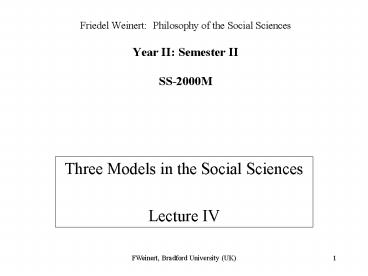Friedel Weinert: Philosophy of the Social Sciences Year II: Semester II SS-2000M - PowerPoint PPT Presentation
1 / 14
Title:
Friedel Weinert: Philosophy of the Social Sciences Year II: Semester II SS-2000M
Description:
Regularities to be related to human agency they are subject to social science explanations ... Explanation = Explanandum & Explanans & Entailment. Social ... – PowerPoint PPT presentation
Number of Views:26
Avg rating:3.0/5.0
Title: Friedel Weinert: Philosophy of the Social Sciences Year II: Semester II SS-2000M
1
Friedel Weinert Philosophy of the Social
SciencesYear II Semester IISS-2000M
- Three Models in the Social Sciences
- Lecture IV
2
Social Sciences 3 Models
- Central Questions
- What is the subject matter of the social
sciences? - Answer Society
- Can society be understood by the methods of the
natural sciences (Freud, Durkheim)? - Or does the subject matter society require an
approach specific to it? - Three models
- naturalistic view ?explanation
- societal facts are subject to societal laws
- interpretative view ?understanding (Verstehen)
- social action must be understood by reference to
human agency - critical view ?explanatory understanding and
criticism - conservative and critical functions of the social
sciences
3
Social Sciences 3 Models
- Some preliminaries
- associated with these models are standard issues
- scientism-humanism issue
- cause-reason distinction
- causation in social sciences
- individualism-holism issue/relativism
- fact-value question
- laws and models in the social sciences
- Meaning of Understanding
- understanding of natural
- versus
- understanding of social processes
4
Social Sciences 3 Models
- Natural Sciences
- Explanation ? Entailment or Causal Patterns
- Understanding ? Interpretation of mathematical
formalism - assignment of physical models to mathematically
described natural processes. - billiard ball model of gases
- models of light as particles or waves
- Copernican models of planetary motions
- assignment of causal mechanisms to phenomena
- why planets move in orbits (Hooke, Newton)
- why radioactive decay (Rutherford)
- why patients suffer from neuroses? (Freud)
5
Social Sciences 3 Models
- Social Sciences
- Explanation (?) ? Empirical Model
- Understanding ? Hermeneutic Model, Webers Model
- social action ? social rules (norms, values,
conventions) - individual action ? intentions (reasons, motives)
- regularities are not sufficient
- relate regularities to human agency
Weak version
Strong version
Regularities to be related to human agency they
are subject to social science explanations they
are cross-cultural, cross-national structural
features (ex.globalisation) Essential
toolsevolutionary approaches, hypothetical
models, adequate causation
Social regularities only exist local levels in
particular societies must be understood in terms
of local meaning (Winch) Tool symbolic meanings
6
Social Sciences 3 Models
- The Three Models
- The Empirical Model
- Durkheims Rules
- Consider social phenomena as things, external
objects - Social science research must be objectvie
- Social scientist describes general, rather than
individual social phenomena (social structures,
legal and religious forms) - Decisive feature ? Unity of method
- natural and social sciences employ
hypothetico-deductive method (DN/IS model) - Explanation Explanandum Explanans
Entailment
7
Social Sciences 3 Models
- Scheme of DN/IS Model
- Antecedent Conditions C1C2Cn
Explanans
- General Laws L1, L2.Ln
Logical Deduction or High Probability
Explanandum
E
Description of Empirical Phenomena to be
Explained, Predicted
8
Social Sciences 3 Models
- Some limitations
- the weakness of laws and regularities in social
science - at best statements of statistical tendencies,
regularities allowing exceptions (trends, cycles
versus laws) - trends can be reversed, modified
- trends are inductively generalised patterns of
behaviour - explanatory role of human agency
- set of initial conditions not closed
- difficulty to distinguish genuine from apparent
exceptions
9
Social Sciences 3 Models
- Decisive feature ? Causal analysis
- search for the cause of social regularities
(rationalisation of society) or particular events
(war) - Weber notion of adequate causation a set of the
most probable (sufficient) conditions which will
have brought about a particular historical event
(rationalisation, war)
10
Social Sciences 3 Models
- Causal relationships in the social sciences
- modernisation of state/society ? emergence of
civility (N. Elias) - structural changes (differentiation and
reflexivity) ? emergence of modern, rationalised
societies (Habermas) - rising grain prices cause peasant unrest
- changes in technology cause changes in ideology
- a cluster of political and social factors are
most likely to have brought about the French
Revolution - Question Do observable changes originate on the
individual or collective level? Do we adopt
Individualism or Holism?
11
Secularisation/3 Models
Social Sciences 3 Models
- Individualism
- bottom up approach (Mill) (A. Smith)
- derive the phenomena of society from the
phenomena of human nature - the laws of the phenomena of society reduce to
the laws of the action of individual human
beings, united in the social world - causal regularities underlying social phenomena
reflect facts about individual agents
(intentions, reasons, motives) - Example of individualist account of causation
Antecedent Conditions Extension of public
transport to outlying districts of a major city
Causal Chain
Consequent Conditions Deterioration of public
schools in inner city
12
Social Sciences 3 Models
- Holism
- top down approach (Marx, Durkheim)
- explain the actions of individuals by reference
to underlying social structures - social facts do not reduce to individual facts
- social phenomena exert force on individual
- explanation of social life must be sought in the
nature of society - social life as a result of the interdependence
and interrelationship between individual members - Examples of holist account of causation
- Durkheims study of suicide
- poverty and political instability
13
Social Sciences 3 Models
- Durkheims study of suicide
?
Suicide Rates Rise of 100 between 1856-1878
Individual Factors illness, poverty unchanged
Social Factors Degree of Social Integrity
-Too little social integration -too much social
integration -rapid changes in social integration
Egoistic Suicide Altruistic Suicide Anomic Suicide
14
Social Sciences 3 Models
- Poverty as cause of political instability
Structural Changes and Modernisation
Individual Poverty
Erosion of traditional restraint on behaviour
Political Mobilisation
Elite Intransigence
Political Instability































